I do
not claim for it a place as history; I delight to call it a story. Based on
tradition, Macaulife and Todd have done valuable work on the subject. Our
contemporaries have carried out researches on Mira, and are alleged to have
exploded many established traditions assigned to her, especially the one which
ascribes the maltreatment of Mira B51 by her husband. The fact is, the
persecutions began after the death of her husband, who was all love to her, and
were met at the hands of the husband's brother at the instigation of his sister
Uddbai. With profit, readers interested in the subject might refer to either
class of writings.
To me
Mira is the moth that burnt itself in the candle of love for Giradhara and for
all times filled the Temple of Devotion with fragrance. Undaunted by fire or
frown, unperturbed by persecutions, this devotee of Sri Krsna sang her songs of
princely renunciation and self-surrender, that shall infuse courage in the
aspirant on the Path of Love. Mira lived the message she preached, scoffed at
cold intellectualism and boldly proclaimed the doctrine of absolute faith in,
and devotion to the Lord.
Modern
Science and Art might well mock at her poetic outbursts and call those
emotional effusions as mere paroxyms of a maniac or the after-effects of an
"overheated" brain; I, however, maintain that these charges are
untenable. I hold it honestly and express it emphatically that the Path to
Salvation lies through love and devotion, which transcend reason and intellect.
Let them, who will, try it Mira has given the lead and with a smile softly
playing on her lips she beckons to us let them who will follow.
The
Devotees of the Lord
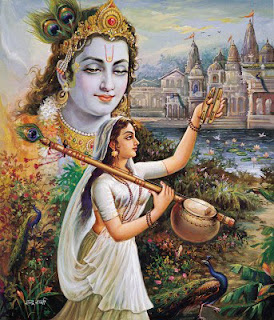 Look at
those eyes, those beautiful little orbs that seem to reflect the whole universe
and point to the Unknown. The gospel of Love and Truth that they are preaching,
the religion of tears that they are proclaiming, the joy of holiness that they
are showering, all shed a glow at once resplendent and captivating. Their
language is so mute, yet so expressive; they have no tongue, yet speak so
vividly of the mighty experiences of the days of separation and recite the tale
of pathos, of parting and of meeting, with a clarity that transcends the
attempts of the artist's brush. On canvas I have witnessed many sights, but
seldom has it been rendered so living as when I saw tears of gratitude in the
penitent's eye as he sat bathing under the showers of the Master's grace, or
the pearly drops in the eyes of the devotee as he sat in meditation. Few
realize, much less experience, the joys that fall to the lot of the Blessed.
These are the children of God, nurtured on the bed of sorrow, on whose head was
showered the ridicule of the world, whose food has been the crushings of their
heart and whose drink has been the pangs of affliction. Some born in the manger,
others discovered forlorn by the tank, and yet others forsaken to the fire and
the winds, these are the heralds that announce the approach of a higher power
that points to the great IDEAL. Their joy is in the distant meeting and their
satisfaction lies in the gleaming hope that sheds lustre in the distance and
whose prize is the CROWN OF ETERNAL BLISS. Such are the devotees of the Lord.
Look at
those eyes, those beautiful little orbs that seem to reflect the whole universe
and point to the Unknown. The gospel of Love and Truth that they are preaching,
the religion of tears that they are proclaiming, the joy of holiness that they
are showering, all shed a glow at once resplendent and captivating. Their
language is so mute, yet so expressive; they have no tongue, yet speak so
vividly of the mighty experiences of the days of separation and recite the tale
of pathos, of parting and of meeting, with a clarity that transcends the
attempts of the artist's brush. On canvas I have witnessed many sights, but
seldom has it been rendered so living as when I saw tears of gratitude in the
penitent's eye as he sat bathing under the showers of the Master's grace, or
the pearly drops in the eyes of the devotee as he sat in meditation. Few
realize, much less experience, the joys that fall to the lot of the Blessed.
These are the children of God, nurtured on the bed of sorrow, on whose head was
showered the ridicule of the world, whose food has been the crushings of their
heart and whose drink has been the pangs of affliction. Some born in the manger,
others discovered forlorn by the tank, and yet others forsaken to the fire and
the winds, these are the heralds that announce the approach of a higher power
that points to the great IDEAL. Their joy is in the distant meeting and their
satisfaction lies in the gleaming hope that sheds lustre in the distance and
whose prize is the CROWN OF ETERNAL BLISS. Such are the devotees of the Lord.
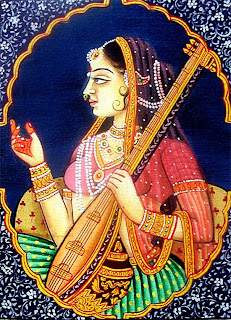 I lay
in the lap of my mother, hearing the tale of one such child of the Lord, when
the motherly caresses lulled me to sleep and lo! in my dreams whom else should
I meet but child of my fancy and I cried out...
I lay
in the lap of my mother, hearing the tale of one such child of the Lord, when
the motherly caresses lulled me to sleep and lo! in my dreams whom else should
I meet but child of my fancy and I cried out...
“These
tear-bedimmed eyes, these dishevelled hair, this fragile constitution, wrapped
in the divine ochre, is this the child of love whose tale you were just
reciting to me, mother? In the lanes of Brindaban how like a maniac this
beautiful devotee sometimes rushes sideways, sometimes dances in ecstasy as she
wildly goes to meet the Idol of her adoration with open arms! The only words
that come out of those beautiful thin lips and charm the passer-by are ‘Govinda,
Govinda, Govinda.' Sweet is their melody and rhythmic is their metre. They seem
to mock at the technical rules of prosody. So comprehensive in their
significance are these words as they come out of the lips of a devotee that one
stares in awe at their sanctity and marvels at their meaning. They seem to lay
bare to the dreamer the pathos of ages, and teach him the lesson of the highest
form of love that merges the finite in the Infinite and ushers him into the
mysteries of the Unexplored Region.
However
mystic the words, our holy mother was in her homely way, teaching the greatest
lessons in the simplest language, and that language none else but the language
of love and that expression no other than that of emotion. And, as she passed
along the street, some bowed in reverence and a few mocked her in the same old
way that greeted the great benefactor of the world by the cross.
But her
thoughts were centred in some higher region, and little did she care to turn
round and hear the applause and the sarcasms thus showered. But many a
stranger, better disposed, inquired who that blessed lady was. And the old man
standing at a distance with tears in his eyes said, my son, she is our blessed
mother that has made the soil of this spot sacred, and has once more recalled
the days of the Rasalila of ages past and is enacting in our midst once again
in all its genuineness and glory the drama of our Lord Krsiia. And as she
dances in ecstasy, the Lord Himself appears and makes His presence felt by
everybody seated close to the feet of the holy mother, as she sits wrapt in
meditation.
Once a
princess, now a beggar in the lanes of love, various are her pet names; but to
me the only name, with which the children of the cowherds accost her as they
feed her with their cow's milk and ask her to sing to them the old forlorn
songs of the Gopis of Vraja, appeals the most. While round the neck of the
lovely docile figure they cling and call out to their comrades, ringing the air
by their cries, come, friends, run, enjoy; for, once more has Mirã come; and
they rush and dance in the shades of the trees while Mira sings…
‘Govinda,
Govinda, Giradhara Govinda.' And, as she weeps and laughs, in her ecstasy, she
swoons away to rest in the lap of her dear Lord. The children terrified begin
to cry, and the Lord pitying them, rouses the fainted beauty again to pass her
time among the innocent children. Thus pass the days of the holiest of the
holy.
Writer - Bankey Behari
 Look at
those eyes, those beautiful little orbs that seem to reflect the whole universe
and point to the Unknown. The gospel of Love and Truth that they are preaching,
the religion of tears that they are proclaiming, the joy of holiness that they
are showering, all shed a glow at once resplendent and captivating. Their
language is so mute, yet so expressive; they have no tongue, yet speak so
vividly of the mighty experiences of the days of separation and recite the tale
of pathos, of parting and of meeting, with a clarity that transcends the
attempts of the artist's brush. On canvas I have witnessed many sights, but
seldom has it been rendered so living as when I saw tears of gratitude in the
penitent's eye as he sat bathing under the showers of the Master's grace, or
the pearly drops in the eyes of the devotee as he sat in meditation. Few
realize, much less experience, the joys that fall to the lot of the Blessed.
These are the children of God, nurtured on the bed of sorrow, on whose head was
showered the ridicule of the world, whose food has been the crushings of their
heart and whose drink has been the pangs of affliction. Some born in the manger,
others discovered forlorn by the tank, and yet others forsaken to the fire and
the winds, these are the heralds that announce the approach of a higher power
that points to the great IDEAL. Their joy is in the distant meeting and their
satisfaction lies in the gleaming hope that sheds lustre in the distance and
whose prize is the CROWN OF ETERNAL BLISS. Such are the devotees of the Lord.
Look at
those eyes, those beautiful little orbs that seem to reflect the whole universe
and point to the Unknown. The gospel of Love and Truth that they are preaching,
the religion of tears that they are proclaiming, the joy of holiness that they
are showering, all shed a glow at once resplendent and captivating. Their
language is so mute, yet so expressive; they have no tongue, yet speak so
vividly of the mighty experiences of the days of separation and recite the tale
of pathos, of parting and of meeting, with a clarity that transcends the
attempts of the artist's brush. On canvas I have witnessed many sights, but
seldom has it been rendered so living as when I saw tears of gratitude in the
penitent's eye as he sat bathing under the showers of the Master's grace, or
the pearly drops in the eyes of the devotee as he sat in meditation. Few
realize, much less experience, the joys that fall to the lot of the Blessed.
These are the children of God, nurtured on the bed of sorrow, on whose head was
showered the ridicule of the world, whose food has been the crushings of their
heart and whose drink has been the pangs of affliction. Some born in the manger,
others discovered forlorn by the tank, and yet others forsaken to the fire and
the winds, these are the heralds that announce the approach of a higher power
that points to the great IDEAL. Their joy is in the distant meeting and their
satisfaction lies in the gleaming hope that sheds lustre in the distance and
whose prize is the CROWN OF ETERNAL BLISS. Such are the devotees of the Lord.  I lay
in the lap of my mother, hearing the tale of one such child of the Lord, when
the motherly caresses lulled me to sleep and lo! in my dreams whom else should
I meet but child of my fancy and I cried out...
I lay
in the lap of my mother, hearing the tale of one such child of the Lord, when
the motherly caresses lulled me to sleep and lo! in my dreams whom else should
I meet but child of my fancy and I cried out... 
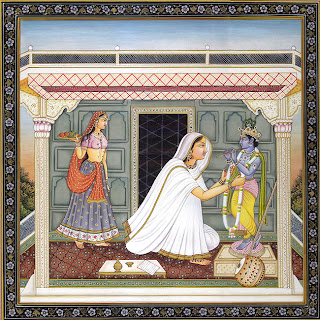
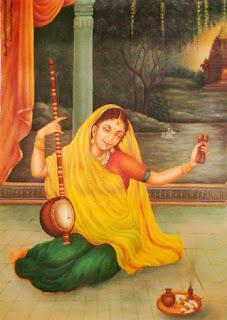

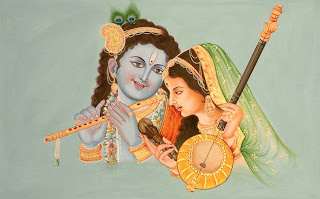










0 Response to "Introduction to Mira Bai and Her Devotion to the Lord"
Post a Comment